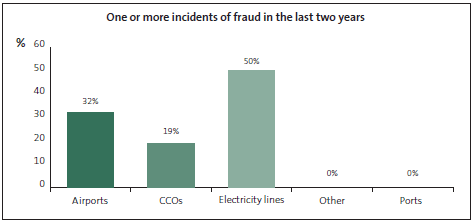Part 3: Incidents of fraud
Despite our generally "clean" image, fraud is a fact of business life in New Zealand. Respondents from airports, council-controlled organisations, and electricity lines businesses were aware of at least one incident of fraud or corruption in their entity within the last two years.

Local government – other and port company respondents could not recall any incidents of fraud in the last two years. For these reasons, local government – other and port companies are not included in the following discussion.
Those who knew of an incident in the last two years were asked for details of the most recent incident. Most of the fraud incidents in these entities were committed by one internal person acting alone, typically at an operational level.
The value of the most recent fraud noted by respondents was mostly low, with many below $1,000 and, for some types of entities, up to 79% below $10,000. This trend of low dollar values was common to all sectors in our survey.
The most frequent type of fraud for airports (40%) was theft of cash. The most frequent type of fraud for electricity lines businesses was theft of inventory (29%).
For airports, 40% of fraud incidents were detected by internal tip-off (other than through a formal whistle-blowing system), 20% by internal controls, and 20% by accident. The remaining 20% of respondents did not know how the fraud was detected.
Internal controls detected 50% of fraud incidents for electricity lines businesses, 13% were detected by internal tip-off (other than through a formal whistle-blowing system), and 13% were detected by internal audit.
Council-controlled organisations experienced a wider range of fraud. The most frequent types of fraud within council-controlled organisations were:
- payroll fraud (21%);
- theft of cash (16%);
- theft of plant, property, and equipment, and inventory (27% combined);
- false invoicing (11%); and
- misuse of fuel cards (11%).
Internal controls detected 41% of the fraud incidents in council-controlled organisations. This reinforces the message that internal controls are crucial in not only preventing fraud but detecting it should it occur.
Respondents from council-controlled organisations said that 6% of the fraud incidents were detected by the external auditor. No respondents from airports and electricity lines businesses said that fraud incidents were detected by the external audit. This low percentage is not surprising, because detecting fraud is neither the purpose nor the focus of an external audit.
The most common reasons why fraud occurred for all entities were that the perpetrator did not think they would get caught and that internal controls were not followed or were overridden.
Questions 32 to 40 in Appendix 1 set out the survey response data about incidents of fraud.
page top